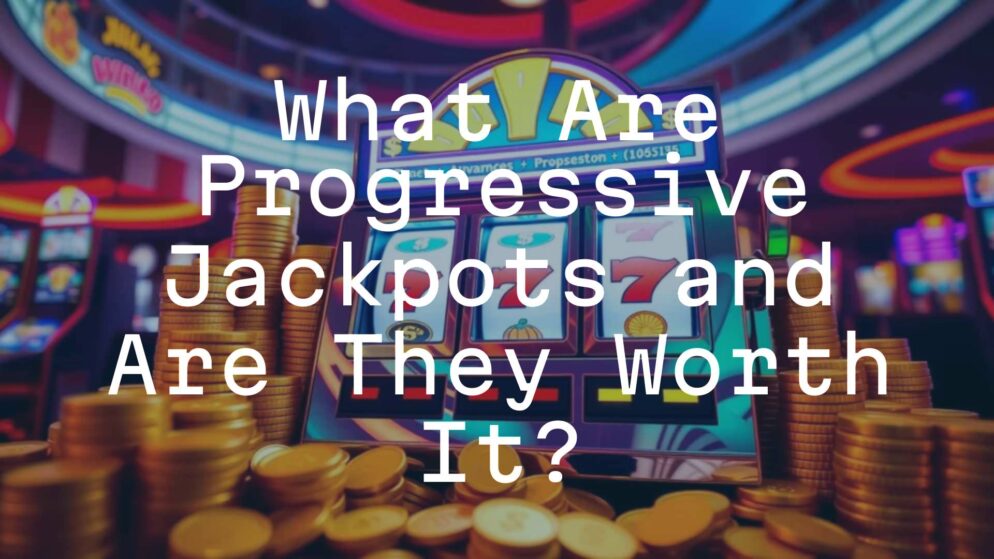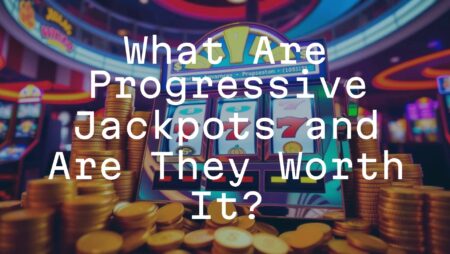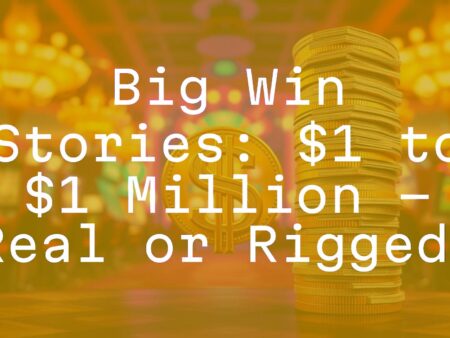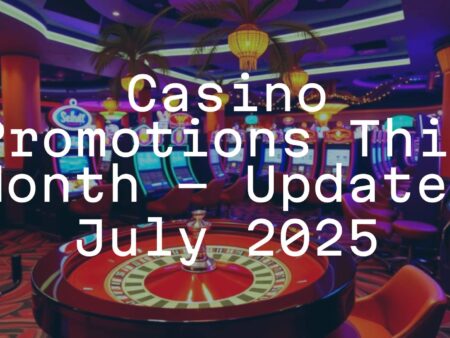

Progressive jackpots are often seen as the ultimate prize in a casino, growing over time and offering a chance at winning large sums of money with a single bet. But are these massive prizes really worth going after, or are they mostly a clever way to get people to play more? Progressive jackpots do offer much bigger payouts than regular games, but your odds of winning are much lower and the house has a larger advantage. Whether they’re “worth it” depends on how much you enjoy the risk and excitement of possibly winning a life-changing amount. Let’s take a clear look at how progressive jackpots work, what types exist, the odds involved, and whether chasing them is a good idea for you.

What Are Progressive Jackpots?
A progressive jackpot is a casino prize that increases every time someone plays but doesn’t win. Imagine a shared pot that grows with each bet-every time a player makes a wager on a linked game, part of their money goes into this pool. This continues until someone hits the jackpot, at which point the prize resets to a starting amount and the buildup begins again. Progressive jackpots can be found not just in slots, but also in some lottery games, video poker, and certain table games like Caribbean Stud Poker and blackjack.
The idea of the progressive jackpot started back in 1986 with a new slot machine called Megabucks. The first major jackpot was won in 1987, totaling nearly $5 million. Since then, these growing prize pools have only become more popular, with casinos displaying the latest totals on big screens to catch players’ attention.
How Do Progressive Jackpots Work?
Progressive jackpots operate on a simple principle: every bet made on the game adds a small percentage to the jackpot. Let’s say a slot takes $1 per spin and 1% goes to the jackpot-each spin adds just one cent. But with thousands or millions of plays, that tiny amount quickly snowballs into a huge prize. When a player wins the jackpot, the prize resets to its base value (called the “seed”), which is paid by the casino or game developer. This keeps the prize attractive and encourages new players to join in, as there is always something substantial to win.

How Are Progressive Jackpots Different from Fixed Jackpots?
There’s a clear difference between progressive jackpots and fixed jackpots. With a fixed jackpot, the top prize never changes, no matter how many times the game is played or how much is bet. For example, a regular slot might always pay out $5,000 for a certain winning combination.
A progressive jackpot, however, keeps increasing as people play. The more bets placed, the higher the jackpot grows, often reaching millions. While progressive jackpots are much harder to win, their big payouts are the main draw. Fixed jackpots might pay out more often, but the prizes are much smaller. This is important for players to keep in mind-progressive jackpots offer less frequent but far larger wins.
Types of Progressive Jackpots
Not all progressive jackpots are the same. They come in different types, each with its own way of growing and paying out. Knowing the difference can help you make better decisions when playing.
- Standalone Progressive Jackpots: Only one machine or game is involved. Bets on this machine go to its own jackpot, so it grows slowly and usually tops out at lower amounts. These jackpots can sometimes be easier to win since fewer players are involved.
- Local (Networked) Progressive Jackpots: Multiple machines within the same casino or online site are connected. Because more people are playing, the jackpot grows faster and gets bigger, sometimes reaching hundreds of thousands of dollars.
- Wide-Area (Global) Progressive Jackpots: These link machines across different casinos, sometimes even in different countries. All connected machines add to the same prize pool, which means jackpots can climb into the millions. However, with so many people chasing them, your chances of hitting the top prize are very low.
Other variations include “must-hit-by” jackpots, which have to be won before reaching a certain amount, and “mystery jackpots,” which can be triggered at random. Some games also scatter smaller jackpots alongside the main one (“Mini,” “Minor,” “Major,” “Mega”), giving players more frequent, but smaller, chances to win.

How Are Progressive Jackpots Funded and Won?
Progressive jackpots rely on the contributions of all players who take part. A small slice of every bet made on these games is added to the main prize money. This system helps jackpots grow quickly, especially when many people are playing.
What Adds Money to the Jackpot?
Every time you bet on a linked game, a set percentage (often around 1%) of your wager goes straight into the progressive jackpot pool. While each amount is small, thousands of players can make these prizes increase rapidly. When machines across several casinos are connected, this growth is even faster and helps the jackpot reach large sums that attract more players.
How Do You Win a Progressive Jackpot?
The way to win a progressive jackpot depends on the game, but it’s always random and based on chance. Here are the main ways a jackpot can be triggered:
- Random Triggers: Some games let the jackpot drop at any time, on any spin, regardless of what symbols you hit.
- Bonus Games: Others require you to enter a bonus round (usually by landing certain symbols). You can then win the jackpot within this feature.
- Specific Symbol Combinations: Traditional setups have you collect certain symbols on a payline. Some versions may also require you to play with the maximum bet to qualify for the top prize.
Each spin is decided by a Random Number Generator, meaning there’s no pattern, and jackpots are never “due.” Every outcome is completely separate from the previous one.
Jackpot Seed Values
After a jackpot is won, it resets to a starting value, known as the “seed.” This is the amount funded by the casino or game provider, so the jackpot never reaches zero. Smaller jackpots might reset to $10,000 or $50,000, while major wide-area jackpots like Mega Moolah can restart at over $1 million. Keeping a healthy seed means there’s always enough at stake to get people playing again.
Odds and RTP for Progressive Jackpot Slots
The big pull of progressive jackpots is the size of the possible payout, but the odds of winning are very low, and the return to player (RTP) is usually smaller. It’s a mistake to think that a bigger jackpot means better chances or better returns.
House Edge and Return to Player (RTP)
Every casino game is built to give the house an advantage. For progressive slots, this is usually greater than in non-progressive slots. Because a chunk of your bet goes to the jackpot pool (and not the base game wins), progressive slots typically offer lower RTP-usually around 88-92%, compared to 96% or more for standard slots. This means on average, players get back less money over time.
Things That Affect Your Chances of Winning
- Bet Size: Older progressive slots often require you to bet the max to qualify for the jackpot. Newer games might allow lower bets, but bigger bets may still improve your odds.
- Bonus Rounds & Special Symbols: You often need to unlock a bonus game or hit rare combinations, which affects your winning chances.
- High Volatility: These games tend to pay out less often but in larger amounts. You’ll face longer stretches of no wins, and swings in your balance can be big. Good money management is important here.
- Number of Players: For network and wide-area jackpots, more players contribute to the pool, so the pot grows quickly but the competition is much stronger.
No matter how big the jackpot is, the likelihood of winning stays extremely low every spin. There’s nothing you can do to “make it your turn”-the RNG ensures total randomness.
Does a Bigger Jackpot Change the RTP?
The actual RTP of a progressive slot is built into the game and doesn’t change as the jackpot grows. However, sometimes a very high jackpot can create special situations (mainly in games like certain video poker ones) where the expected return might, in theory, go above 100%. But for regular slot machines, it’s almost impossible for the average player to know that break-even point because the game’s design details aren’t published. The odds of winning the biggest jackpots-like those in MGM Grand Millions-can be worse than 1 in 100 million, no matter the jackpot size.

Pros and Cons of Progressive Jackpots
Progressive jackpot games offer both benefits and trade-offs. Here’s a clear rundown so you can make a smart choice:
Good Points: Huge Prizes & Excitement
- Huge Payouts: You could turn a small bet into millions. Some jackpots reach headline-making amounts, with wins of $4.5 million or more in games like MGM Grand Millions.
- Thrilling Experience: The fast-growing prize meters and big potential wins add to the excitement, making these games especially fun for many people.
- Easy to Access: You can play progressive jackpots online any time, from anywhere, and with any budget.
Bad Points: Worse Odds & Lower Regular Payouts
- Lower RTP: Compared to regular slots, progressive ones usually pay back less over time since a part of each bet feeds the jackpot.
- Rare Wins: The odds of hitting the jackpot are very long-often 1 in 10 million or worse.
- High Risk: Wins come in bursts, so you’ll often deal with long periods of not winning, which can be tough on your bankroll and patience.
- Temptation to Chase Losses: The dream of a big payout can lead some players to keep betting even after losing, which can be risky.

Are Progressive Jackpots a Good Choice?
If your goal is to win frequently or make your money last, progressive jackpots aren’t the best pick. Games with higher RTP or lower house edges, like regular slots or card games, will give you better, more consistent returns. But if you want a chance at a huge win and are okay with the risks, then playing progressives can be fun, as long as you set a firm budget and don’t expect to win the top prize. For most people, these games are best viewed as “just for fun”-a bit like buying a lottery ticket.
Should You Play Progressive Jackpots or Other Games?
Choosing between progressive jackpots and other casino games comes down to what you want out of gambling: excitement and the chance at a huge win, or steady, more frequent rewards? Let’s compare your options directly.
Progressive Jackpots vs. High-RTP Slots
| Feature | Progressive Jackpots | High-RTP Slots/Other Games |
|---|---|---|
| Payout Size | Very high | More moderate, but more frequent |
| Odds of Winning Big | Very low | Better chances for smaller wins |
| Return to Player (RTP) | Usually 88-92% | Often 96% or higher |
| Game Experience | High drama, long losing streaks | Smoother, less risky |
| Best For | Chasing the dream prize | Longer play, regular wins |
If you spend $100 on a 96% RTP slot, you’ll lose about $4 on average; but with a 90% RTP progressive, you lose about $10-part of which helps build the jackpot. Games like Blood Suckers (98% RTP) or Starmania (97.87% RTP) are more “bankroll-friendly.”
Games like blackjack with perfect basic strategy offer a house edge below 1%, and video poker versions can return over 99% with expert play. If you care most about lasting longer and having chances to win more often, these are smarter picks than progressives.

You can still try progressive jackpots for the fun of it, but if you want the best returns on your bets, stick to high-RTP games or table games with low house edges. Always set limits, know the odds, and never chase your losses. Big progressive jackpots can be thrilling, but in the long run, the odds are steeply against you-so play for entertainment, not as a strategy for profit.








